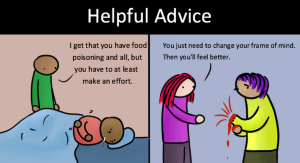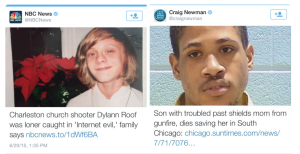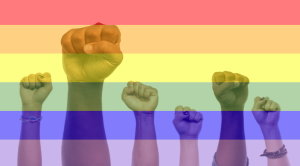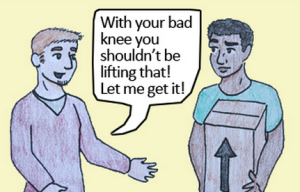
Source: Getty Images
Imagine for a moment that you’re standing with your friends in a park, enjoying a nice summer day.
You don’t know me, but I walk right up to you holding a Frisbee.
I wind up – and throw the disc right into your face.
Understandably, you are indignant.
Through a bloody nose, you use a few choice words to ask me what the hell I thought I was doing.
And my response?
“Oh, I didn’t mean to hit you! That was never my intent! I was simply trying to throw the Frisbee to my friend over there!”
Visibly upset, you demand an apology.
But I refuse. Or worse, I offer an apology that sounds like “I’m sorry your face got in the way of my Frisbee! I never intended to hit you.”
Sound absurd? Sound infuriating enough to give me a well-deserved Frisbee upside the head?
Yeah.
So why is this same thing happening all of the time when it comes to the intersection of our identities and oppressions or privileges?
Intent v. Impact
From Paula Deen to Alec Baldwin to your annoying, bigoted uncle or friend, we hear it over and over again: “I never meant any harm…” “It was never my intent…” “I am not a racist…” “I am not a homophobe…” “I’m not a sexist…”
I cannot tell you how often I’ve seen people attempt to deflect criticism about their oppressive language or actions by making the conversation about their intent.
At what point does the “intent” conversation stop mattering so that we can step back and look at impact?
After all, in the end, what does the intent of our action really matter if our actions have the impact of furthering the marginalization or oppression of those around us?
In some ways, this is a simple lesson of relationships.
If I say something that hurts my partner, it doesn’t much matter whether I intended the statement to mean something else – because my partner is hurting.
I need to listen to how my language hurt my partner. I need to apologize.
And then I need to reflect and empathize to the best of my ability so I don’t do it again.
But when we’re dealing with the ways in which our identities intersect with those around us – and, in turn, the ways our privileges and our experiences of marginalization and oppression intersect – this lesson becomes something much larger and more profound.
This becomes a lesson of justice.
What we need to realize is that when it comes to people’s lives and identities, the impact of our actions can be profound and wide-reaching.
And that’s far more important than the question of our intent.
We need to ask ourselves what might be or might have been the impact of our actions or words.
And we need to step back and listen when we are being told that the impact of our actions is out of step with our intents or our perceptions of self.
Identity Privilege and Intent
For people of identity privilege, this is where listening becomes vitally important, for our privilege can often shield us from understanding the impact of our actions.
After all, as a person of privilege, I can never fully understand the ways in which oppressive acts or language impact those around me. What I surely can do is listen with every intent to understand, and I can work to change my behavior.
Because what we need to understand is that making the conversation about intent is inherently a privileged action.
The reason?
It ensures that you and your identity (and intent) stay at the center of any conversation and action while the impact of your action or words on those around you is marginalized.
So if someone ever tells you to “check your privilege,” what they may very well mean is: “Stop centering your experience and identity in the conversation by making this about the intent of your actions instead of their impact.”
That is: Not everything is about you.
“What They Did” vs. “What They Are”
The incredible Ill Doctrine puts it well when he explains the difference between the “What They Did” conversation and the “What They Are” conversation, which you can watch here.
In essence, the “intent” conversation is one about “what they are.”
Because if someone intended their action to be hurtful and racist/sexist/transphobic/pickyourpoison, then they must inherently be racist/sexist/transphobic/pickyourpoison.
On the other hand, the “impact” conversation is one about “what they did.”
For you, it takes the person who said or did the hurtful thing out of the center and places the person who was hurt in the center. It ensures that the conversation is about how “what they did” hurts other people and further marginalizes or oppresses people.
And it’s important for people to understand the difference.
Just because you did something sexist doesn’t mean that you are sexist. Just because you said something racist doesn’t mean that you are racist.
When your actions are called into question, it’s important to recognize that that’s all that is being called into question – your actions, not your overall character.
Listen. Reflect. Apologize. Do Better.
It doesn’t matter whether we, deep down, believe ourselves to be __________-ist or whether we intended our actions to be hurtful or _________-ist.
It.Doesn’t.Matter.
If the impact of our actions is the furthering of oppression, then that’s all that matters.
So we need to listen, reflect, apologize, and work to do better in the future.
What does that look like?
Well, to start, we can actually apologize.
I don’t know about you, but I am sick of hearing the ““I am sorry your face got in the way of my Frisbee! I never intended to hit you” apologies.
Whether it’s Paula Deen weeping on TV or Alec Baldwin asking us to simply trust that he’s not a “homophobe,” those are not apologies.
That’s why I was incredibly inspired and relieved to see a major organization do it well when Kickstarter apologized and took full responsibility for their role in funding a creepy, rapey seduction guide.
They apologized earnestly and accepted the role they played in something really terrible. hey pledged to never allow projects like this one to be funded in the future. And then they donated $25,000 to RAINN.
At the interpersonal level, we can take a cue from Kickstarter.
When we are told that the impact of our action, inaction, or words is hurtful and furthers oppression, we can start by apologizing without any caveats.
From there, we can spend the time to reflect in hopes of gaining at least some understanding (however marginal) of the harmful impact.
And we can do our best to move forward by acting more accountably.
[do_widget id=”text-101″]
Jamie Utt is a Contributing Writer at Everyday Feminism. Jamie is a diversity and inclusion consultant and sexual violence prevention educator based in Minneapolis, MN. He lives with his loving partner and his funtastic dog. He blogs weekly at Change from Within. Learn more about his work at his website here and follow him on Twitter @utt_jamie. Read his articles here and book him for speaking engagements here.
Search our 3000+ articles!
Read our articles about:
Our online racial justice training
Used by hundreds of universities, non-profits, and businesses.
Click to learn more
Most Read Articles
- « Previous
- 1
- …
- 30
- 31
- 32



















